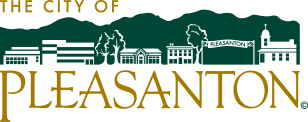Stormwater Pollution Prevention for Businesses
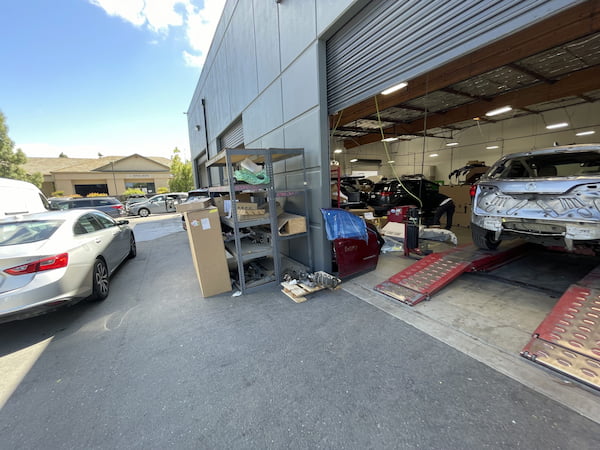
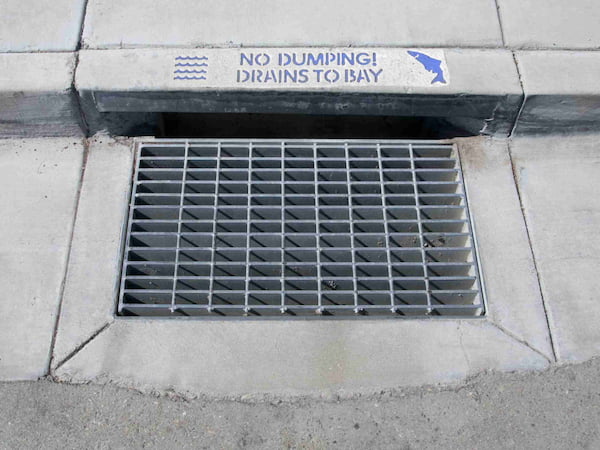
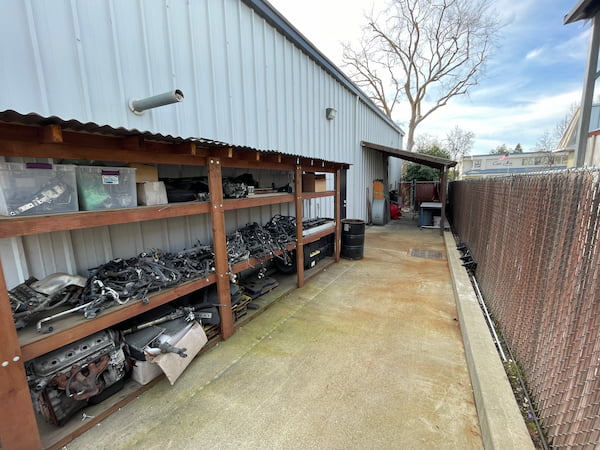
Stormwater Facility Inspections
Why do we inspect businesses?
These inspections are required under C.4 Industrial and Commercial Site Controls, of the San Francisco Bay Regional Water Quality Control Board’s Municipal Regional Stormwater Permit, Order No. R2-2022-0018 (Clean Water Permit) as well as Pleasanton Municipal Code (PMC) sections 9.14.040 (discharge of pollutants), 9.14.060 (discharge in violation of National Pollution Discharge Elimination System Permit), 9.14.080 (E) (Reduction of pollutants in stormwater).
Our storm drains lead directly into the creeks, and out into the bay untreated, making it very important to prevent pollution at the source. The city inspects businesses and facilities within Pleasanton that are reasonably likely to contribute pollutants such as chemicals, trash, fats, oils, greases, metals, and more to our stormwater. These inspections allow the city to ensure that businesses are deploying the proper best management practices (BMP’s) to prevent pollution from entering our stormwater.
How often do we inspect?
The majority of applicable businesses are inspected on a 5-year rotation cycle. However, certain facilities (e.g. those with a NOI or have prior violations) are subject to annual inspections.
What do inspectors look for, and how are violations handled?
This varies from business to business. The pollution prevention guides below detail how your specific business type can prevent pollution from entering our storm system. Inspectors will be looking to make sure that your business is deploying the proper BMP’s specific to your business type as outlined in the guides below. If proper BMPs are not being deployed, a correction notice is issued, and the business will need to implement the proper BMPs before the next rain event and no longer than business days 10 days after discovery.
Food Service Facilities
- Ensure the proper storage of all Fat’s, Oil’s and Grease’s (FOG) – Collect FOG into an appropriate container and have it regularly hauled away by a qualified disposal company. FOG containers stored outdoors, need to have secondary containment, remain enclosed and be covered to ensure rain cannot contact the FOG container.
- DON’T wash kitchen mats outside – Wash kitchen mats indoors near the floor drain or in the mop sink. Or, take the mats to a coin-operated car wash or have a company wash them for you.
- DON’T pressure wash building exteriors and sidewalks using soap unless storm drains are blocked, and wash water vacuumed up or pumped into the sanitary sewer.
- Clean outside waste storage areas and parking areas by first sweeping up food particles, cigarette butts, and trash. If water or cleansers are needed, spot mop the area and dispose of water into a sink or toilet.
- Clean grease spills with an absorbent and then sweep the material up and place into the dumpster.
- Prevent litter by providing adequate receptacles for waste and keeping dumpster lids closed.
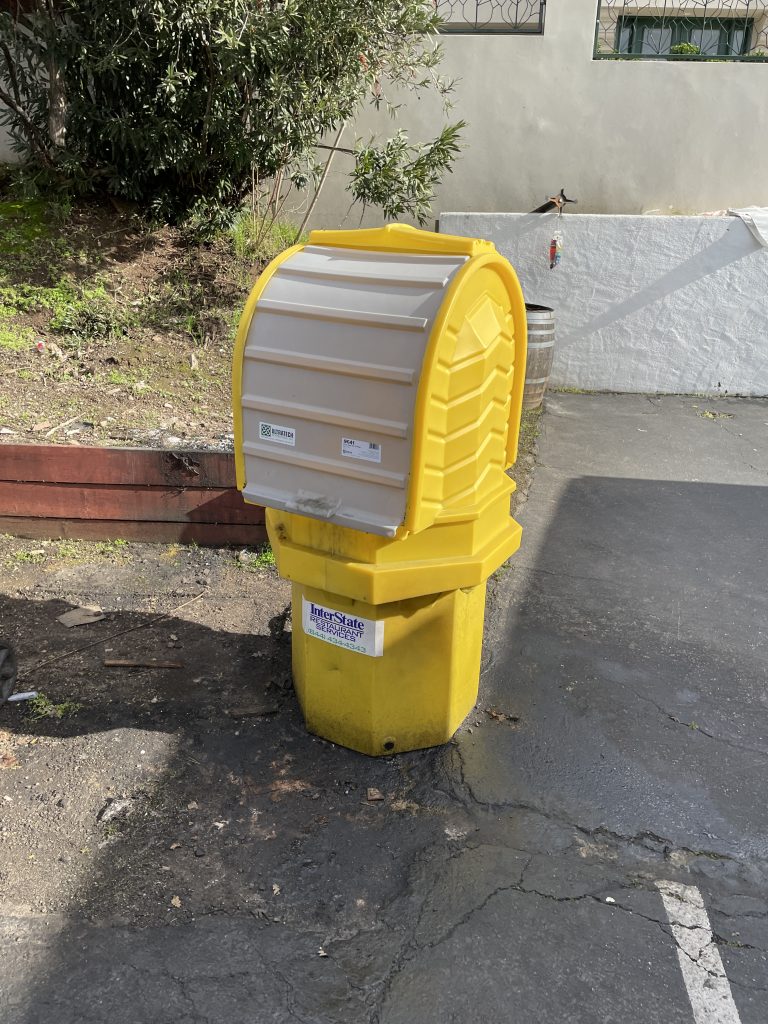
Automotive Facilities
Businesses in the Automotive industry can help prevent pollution from entering our storm drains by implementing the following Best Management Practices (BMP’s). For a complete list of BMP’s download the Vehicle Service Facility BMPs Booklet (English, Spanish, Chinese, Vietnamese).
-
Store hazardous waste properly – Used oil, brake fluids, and other vehicle fluids are harmful to our water ways. Store them inside with secondary containment. If stored outside, containers should be stored in an enclosure which rain cannot contact the container and must have secondary containment. This also applies to containers used to store used oil filters.
-
Store used parts inside or under cover – Used parts can contain oils, grease, rust, and other hazardous materials that can enter our storm drains. Ensure that used parts are stored indoors. When stored outdoors, used parts must be covered from the rain.
-
Prevent and clean up leaks – Have a spill kit in the shop at all times to clean up spills or leaks. These kits should use a dry absorbent to soak up the spill which can be thrown away. Clean up spills and leaks as soon as possible and never use water. Prevent spills from parked, leaking vehicles by placing a catch pan underneath the leak.
-
Do not wash vehicles outdoors – Wash vehicles indoors where wash water can be directed to the sanitary sewer drains. When washing vehicles indoors, ensure that no water exits the building. You may consider installing berms to help contain wash water indoors. If you do not have the ability to wash vehicles indoors, take the vehicle to a car wash that collects and recycles its wash water.
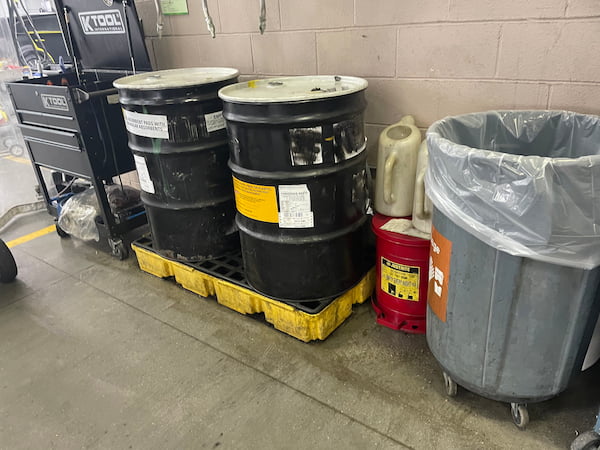
Other Businesses and Facilities
Your business or facility can help prevent pollution from entering our storm drains by implementing the following Best Management Practices (BMP’s):
- General Businesses (English, Spanish, Chinese, Vietnamese)
- Tips for Mobile Businesses
- Tips for Pet Care Providers
- Tips for Pools, Spas, and Fountains
- Tips for Power washing (English, Chinese, Spanish)
- Tips for Mobile Fleet Services
- Tips for Graffiti Removal
- Tips for Fundraising Car Washes
- Tips for Carpet Cleaners
- Tips for Heavy Equipment Yards
Pollution Prevention Program
Keeping trash out of waterways is essential to maintaining a healthy ecosystem. Every time it rains in Pleasanton, trash is collected by stormwater and transported to our storm drains where it is carried to our local waterways and out into the bay.
Federal, State and local laws prohibit water pollution and require municipalities to control sources of pollution, including the implementation of city-wide trash reduction programs to reduce trash and litter accumulation that can be of potential exposure to the City’s storm water system. Pleasanton Municipal Code, Chapter 9.14, prohibits the discharge of pollutants and littering and requires property owners or facility operators to comply with Storm Water Pollution Prevention Best Management Practices to prevent stormwater pollution or contamination.
In accordance with the Regional Water Quality Control Board Municipal Regional Stormwater NPDES Permit, City of Pleasanton (City) staff conducts outside inspections of business parcels to determine trash load which has the potential to enter private storm drain inlets, ultimately impacting the City’s storm water system and entering into waterways.
It is the responsibility of the property owner/representative to ensure parcels are kept free of trash. Properties that are found to have a high trash load, will be required to implement trash load reduction best management practices (BMPs). Deploying the following trash reduction BMP’s will help your property maintain compliance.
- Pick up trash/litter daily
- Sweep parking areas and gutters at least monthly and before rain events
- Pick up dropped waste and sweep dumpster area regularly
- Prevent dumpsters from being overfilled and keep lids closed
- Utilize locks if necessary to prevent others from accessing dumpsters/trash enclosures
- Check/clean outside break areas, sidewalks, and parking areas regularly
- Encourage customers to bring their own reusable bags/containers to reduce use of disposable materials
- Hire a street sweeping service to routinely sweep the parking areas
- Install Full Trash Capture Devices on all storm drain inlets (contact the Environmental Services Division for a list of qualifying devices)
Certified Trash Full Capture Systems Available to the Public.
